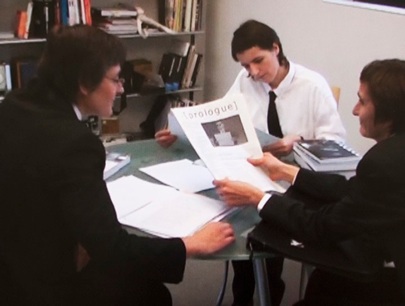ASUNTOS INTERNOS
Internal affairs
Xoán Anleo / Uqui Permui
2006-2007, DVD, color, sound, text, 22’ 40’’.
VO en galego, subtitles spanish - english
1/9 a 9/9 + 4 P. A.
1/9 Collection CGAC, Santiago de Compostela.
Performer: Berlarmina Ordóñez, Colindes Baño, Rosa Bassáve, Laura Bugallo. Ficción: Raquel Barreiro, María Carballo, Sandra Tedín. Camera: Xoán Anleo, Uqui Permui. Edition: Iván Torres, Clara G. Nieto. Make-up: Lola Centeno. Production Uqui III Cebra. Gratittude: María Ruído, Amparito Jiménez, María Xosé Agra, Laura Gómez, María Pino, Nuria Pino, Jorge Quintana, Antón Diaz, Marta piñeiro, Xabier Macias. Location: Celeiro, Santiago, Vilagarcía de Arousa. Premiere: Rencontres Internacionales Paris/ Berlin/Madrid. Paris-Villette
From the private to the public. In Asuntos internos the private life stories of four women of different generations structure the history of the last century. From the republican era to the Franco dictatorship, from exile to the era of transition to democracy, the socialist government and the changes it represented. Each era of history presents its own particular vicissitudes which we have to live through, of whose social fabric we form a part.
The stories of these women run parallel to the march of history, in spite of the fact that women’s role in History (with a capital letter) has been negated.
From their memories we can construct a space and a time. They do not speak about the present, each one of them describes precise moments in their life, situations which had a wider public significance.
The women who lived through the forties and fifties in Spain were subjected to a systematic devaluation, imposed ignorance and the feelings of guilt this involves (Berlamina tells us she never learnt the alphabet because she preferred to go hunting for birds whilst her brother did learn to read and write).
The video also shows the difficulty for these women of narrating their own history: “they were the heroes, I didn’t do anything. I’m a nobody” A daily life of invisibility. With the recounting of the last years of the dictatorship the stories start to change: the liberation of thought, the shrugging off of guilt, reveals the subjugation that women suffered. Women began to dare to decide what to do with their own bodies.
The emergence of feminism in Galicia and the rest of Spain came late in comparison with other European countries and for this reason it was essential to go abroad to see what was happening and, once there, it was impossible not to make comparisons.

